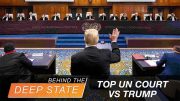
A line of division among the potential Republican candidates for president seems to be developing in the controversy over Common Core “education standards.” Former congressman and present Ohio Governor John Kasich (shown on left), a possible presidential hopeful next year, took off the gloves this past week and implied that opponents of Common Core are liars.
This puts Kasich in the same pro-Common Core boat with former Florida Governor Jeb Bush and Governor Chris Christie of New Jersey. In opposition to the radical education standards are fellow governors Bobby Jindal of Louisiana and Scott Walker of Wisconsin, former Arkansas Governor Mike Huckabee, and U.S. Senators Rand Paul, Ted Cruz, and Marco Rubio.
Speaking on Fox News Sunday, Kasich did not allow that his fellow governors who oppose Common Core were just wrong, or perhaps misinformed; he contended rather that they are playing politics with the issue. “These are governors who helped create Common Core,” he insisted. But with a presidential election looming and the Republican grassroots up in arms against Common Core, Kasich claims they are telling Republicans what they want to hear.
Jindal of Louisiana has filed a lawsuit in federal court, arguing that the federal Department of Education is making an effort to nationalize the curriculum with incentives such as President Obama’s Race to the Top, which are now tied to states’ acceptance of the controversial Common Core standards. “I’ve asked the Republican governors who have complained about this to tell me where I’m wrong,” Kasich said. “Guess what — silence.”
Kasich had already been removed from the short list of viable contenders by many Republican activists because of his expansion of Medicaid in Ohio under ObamaCare. Additionally, back during the Clinton administration, Kasich was one of 42 Republicans who voted for Bill Clinton’s ban on assault rifles. He also favors granting U.S. citizenship to illegal aliens. And, now, Kasich supports Common Core.
“The Common Core was written by state superintendents and local principals,” Kasich claimed, dismissing concerns that it is a part of a federal takeover of the curriculum in the schools. He even insisted that the standards were established by “local school boards.” Kasich was adamant: “Barack Obama doesn’t set it; the state of Ohio doesn’t set it. It is local school boards driving better education, higher standards, created by local school boards.”
So, who is telling the truth? Is it Kasich, who argues that Common Core is not part of a federal takeover of public education, and that it is not a national curriculum? Or is it his opponents, in and out of public office, who are just as adamant that the standards were not written by “local school boards,” but rather are a major element of the effort to create a national curriculum?
Proponents of the Common Core State Standards (CCSS) contend that they were created by the states. They usually give as an example that the standards were written by the National Governors Association (NGA), and the Council of Chief State School Officers (CCSSO). The names of these two organizations certainly make it sound as if it is the states that are responsible for the standards, and not the federal government.
The truth, however, is very different.
ACHIEVE, a non-profit organization, produced the Common Core standards for the NGA and the CCSSO. The president of ACHIEVE is Michael Cohen, who was once a staffer for Bill Clinton when he was governor of Arkansas. Upon reaching the presidency, Clinton pushed for centralizing school curriculum, with Outcomes-Based Education (OBE), School-to-Work, and Goals 2000. The National Governors Association, despite its title, is not dedicated to state sovereignty. It, along with the Council of Chief State School Officers, is a private organization, funded by powerful corporate interests and individuals such as Bill Gates. The legal ownership of Common Core State Standards belongs to the NGA and CCSSO through a copyright.
Kasich’s contention that states and local school boards created these standards is simply not true. Not only did the states not create the standards, but they are not even allowed to make substantive changes to them. The copyright does not allow states to add more than 15 percent to the standards.
Another way in which Common Core leads to the nationalization of public education is through the No Child Left Behind (NCLB) law, which was pushed through Congress by Jeb Bush’s brother, President George W. Bush. The Obama administration has offered waivers from compliance with NCLB, and its burdensome regulations, if states would simply adopt the Common Core State Standards.
So much for local control.
But this is instructive. The control of public education is not one of the enumerated powers given to Congress in the U.S. Constitution. Because of this, the federal government is not allowed to mandate educational standards or curriculum. However, because the federal government appropriates money to the states for use in their public schools, the feds can threaten to cut off those funds if the states do not comply with federal requirements — as they did when the Oklahoma legislature repealed Common Core. With the national testing required by NCLB tied to the standards of Common Core, then Common Core will be, in effect, a national curriculum.
Testing to see if students are learning the standards obviously creates a national curriculum. In fact, the federal government has funded the two testing consortiums that are aligned with Common Core. According to Education Week (April 2013), the federal Department of Education views and revises testing items developed by the consortium.
Much has been written about the specifics of the Common Core standards. For example, the English Language Arts standards have drastically reduced the reading of literature, replacing classics with industrial-style reading material. Sadly, this pleases the corporate world that finances the NGA, because they consider it more important that students learn to read instruction manuals than great works of literature. Those who have read George Orwell’s classic dystopian novel 1984 might recall that the totalitarian government described in the story is desirous of reducing literacy so as to “narrow the range of thought,” and thus lessen the likelihood that the populace would rebel. Great literature (such as Orwell’s book), which causes students to think more critically, is relegated to a much lower level of importance in the Common Core standards.
In the end, the specifics of the standards found in Common Core are not the main issue. The most important point is that the federal government has no constitutional role in the creation of national standards, a national curriculum, and national tests. These were matters that the Founding Fathers left to the states to hash out, as part of the “reserved powers.” Even if William Shakespeare were to create the national English standards, and James Madison were to write up national standards in social studies, it would still be unconstitutional for the federal government to take any role in the development of a national curriculum.
So, it would appear that Governor Kasich is the one who has his facts wrong on Common Core. It is unlikely that Kasich could actually win the Republican nomination, especially with his support of Common Core, ObamaCare, gun control, and citizenship for illegal aliens. However, his status as the governor of the always-key swing state of Ohio could just land him on the ticket as the running-mate of a fellow Republican such as Jeb Bush — another strong supporter of Common Core and a nationalized curriculum.



